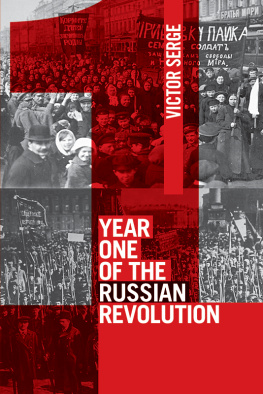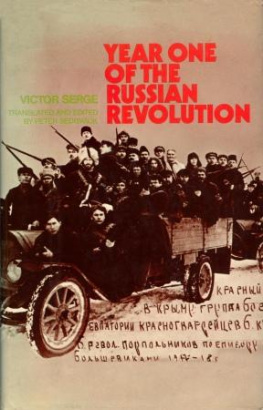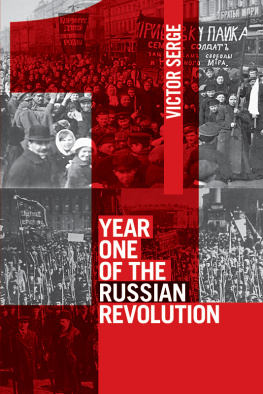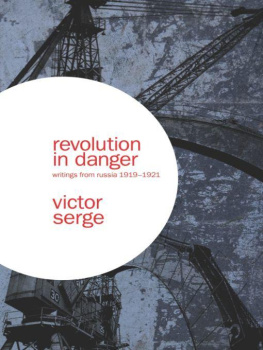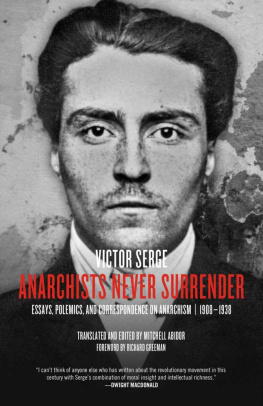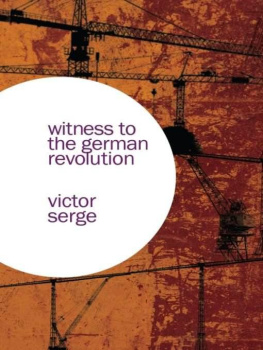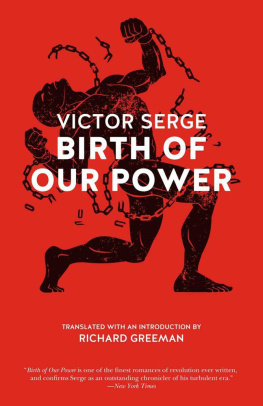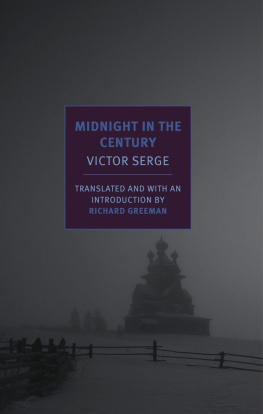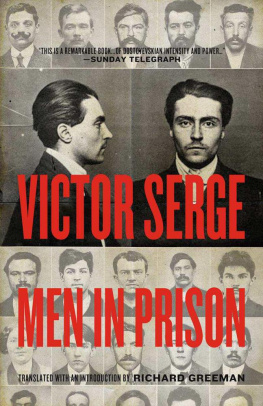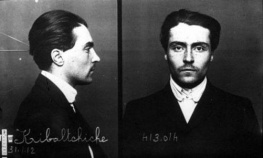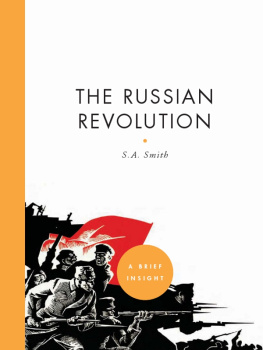Contents
This eBook is licensed to Will Yang, williamyang1997@hotmail.com on 09/21/2019
First published as LAn 1 de la revolution russe in 1930.
Translation, Translators Introduction, and Notes 1972, Peter Sedgwick.
This edition published in 2015 by
Haymarket Books
P.O. Box 180165
Chicago, IL 60618
773-583-7884
info@haymarketbooks.org
www.haymarketbooks.org
ISBN: 978-1-60846-609-2
Trade distribution:
In the US, Consortium Book Sales and Distribution, www.cbsd.com
In the UK, Turnaround Publisher Services, www.turnaround-uk.com
In Canada, Publishers Group Canada, www.pgcbooks.ca
All other countries, Publishers Group Worldwide, www.pgw.com
Cover design by Ragina Johnson.
This book was published with the generous support of Lannan Foundation and the Wallace Action Fund.
Library of Congress Cataloging in Publication data is available.
This eBook is licensed to Will Yang, williamyang1997@hotmail.com on 09/21/2019
I dedicate this work to two proletarian revolutionaries:
to one now dead, dear Vassili Nikiforovich Chadayev, militant in the Leningrad communist organization, 191728, whose principled intelligence, firmness of character and absolute devotiona unique flame burning within himnever wavered even in the bitterest torment and who perished before he could show the fullness of his powers in the service of the revolution, murdered while accomplishing a mission on 26 August 1928, not far from Armavir (Kuban); and
TO A GREAT LIVING REVOLUTIONARY.
V.S.
This eBook is licensed to Will Yang, williamyang1997@hotmail.com on 09/21/2019
The Insurrection of 25 October 1917
THE MASSES
From the rostrum Trotsky had just announced the withdrawal of the Bolsheviks from the Pre-Parliament (Democratic Conference). His voice, grating metallically, hurled the defiance of proletariat and peasantry before the highest authority of the Republic. Then he went out, passing in front of the sailors who were guarding the hall. As he passed them their bayonets wavered, and hard faces with burning eyes turned to the man who had just spoken. Gesturing with their bayonets, they asked him:
When do we use these?
It was 6 October. The Democratic Conference, a mock parliament for the revolution summoned by the SRs and Mensheviks, had opened in Moscow in the middle of the previous month. Strikes had forced it out of the city; the staff in hotels and restaurants had refused to wait upon its members. It had now been transferred to Petrograd, and was deliberating under the protection of a picked unit of the most reliable sailors. But the bayonets of these men shuddered at the passage of a Bolshevik spokesman:
When do we use these?
This state of feeling was general in the fleet. Two weeks before 25 October, the sailors of the Baltic squadron, anchored at Helsinki, demanded that no more time be lost, and that the destruction of the fleet by the Germans, which now appears to us to be inevitable, should be made holy by insurrection. They were willing to die: but only for the revolution. Since 15 May the Kronstadt Soviet had refused to recognize the Provisional Government. After the July riots, the commissars sent by Kerensky to board ships and arrest Bolshevik agitators received only this curt response: Agitators? We are all agitators. It was true. The masses had innumerable agitators.
Delegates from the trenches came to the Petrograd Soviet with speeches of denunciation:
How much longer is this unbearable situation going to last? The soldiers have mandated us to tell you that if peace proposals are not presented immediately and seriously, the trenches will empty and the whole army will come home. You are forgetting all about us! If you cannot find the answer to the situation we shall chase out our enemies ourselves, at bayonet-pointbut you will go with them!
Such, Trotsky relates, was the language of the front. At the beginning of October the insurrection broke out everywhere, spontaneously; peasant risings spread all over the country.
The provinces of Tula, Tambov, Ryazan and Kaluga are in revolt. The peasants have been expecting peace and land from the revolution. They have been disappointed; and so they rise, seize the granaries of the landlords, and burn down their houses. The Kerensky government represses the risings wherever it has the force to do so. Fortunately its resources are limited. Lenin warns that to crush the peasant upsurge means the murder of the revolution.
Within the Soviets of the cities and the armies, the Bolsheviks, until recently a minority, become the majority. In the Moscow Municipal Duma elections, they win 199,337 votes out of 387,262. Of the 710 members elected, 350 were Bolsheviks, 184 Kadets, 104 Socialist-Revolutionaries, thirty-one Mensheviks and forty-one other groups. On the eve of civil war, the moderate, middle-ground parties now fall back, and the extreme parties gain. At a time when the Mensheviks are losing all real influence, and the governing SR party, which only a short while before appeared to carry immense weight, is reduced to the third place, the Kadetsthe bourgeoisies own partyacquire new strength as they line up to face the revolutionaries. At the last elections in June the SRs and the Mensheviks had obtained seventy per cent of the vote: their share now is eighteen per cent. Of the 17,000 soldiers who vote, 14,000 are for the Bolsheviks.
The Soviets are becoming transformed. Once the strongholds of the Mensheviks and the SRs, they are becoming Bolshevized. There are new majorities forming in them. On 31 August in Petrograd and on 6 September in Moscow, the Bolshevik resolutions put before the Soviet obtain a majority for the first time. On 8 September, the Menshevik-SR executives of the two Soviets resign. On 25 September, Trotsky is elected President of the Petrograd Soviet. Nogin On 27 September, the Soviet in Reval decides in principle for all power to the Soviets. A few days before the October Revolution, Kerenskys democratic artillery fires upon the revolutionary Soviet at Kaluga.
A little-known fact is worth recording here. At Kazan, the October insurrection triumphed before it had even begun in Petrograd. One of those who took part relates this dialogue between two militants at Kazan:
What would you have done if the Soviets had not taken power in Petrograd?
It was impossible for us to refuse power, the garrison wouldnt let us.
Moscow would have rubbed you out.
No, you are wrong. Moscow could never have got past the forty thousand soldiers we had at Kazan.
All over this immense country, the whole labouring masses are moving towards revolution: peasants, workers, soldiers. It is an elemental, irresistible surge, with the force of an ocean.
THE PARTY OF THE PROLETARIAT
The masses have a million faces: far from being homogeneous, they are dominated by various and contradictory class interests; the sole means by which they can attain a clear-sighted consciousnesswithout which no successful action is possiblelies in organization. The rebel masses of Russia in 1917 rose to a clear consciousness of their necessary tasks, of their means and the objectives, through the organ of the Bolshevik party. This is not a theory, it is a statement of the facts. In this situation we can see, in superb relief, the relations that obtain between the party, the working class and the toiling masses in general. It is what they actually want, however confusedly, the sailors at Kronstadt, the soldiers in Kazan, the workers of Petrograd, Ivanovo-Voznesensk, Moscow and everywhere, the peasants ransacking the landlords mansions; it is what they all want without having the power to express their hopes firmly, to match them against the economic and the political realities, to formulate the most practical aims and choose the best means of attaining them, to select the most favourable moment for action, to extend the action from one end of the country to the other, to provide the exchanges of information and the necessary discipline, to co-ordinate the innumerable separate efforts that are going onit is what they really want, without being able to constitute themselves into (in a word) a force of the requisite intelligence, training, will and myriad energy. What they want, then, the party expresses at a conscious level, and then carries out. The party reveals to them what they have been thinking. It is the bond which unites them from one end of the country to the other. The party is their consciousness, their organization.
Next page
